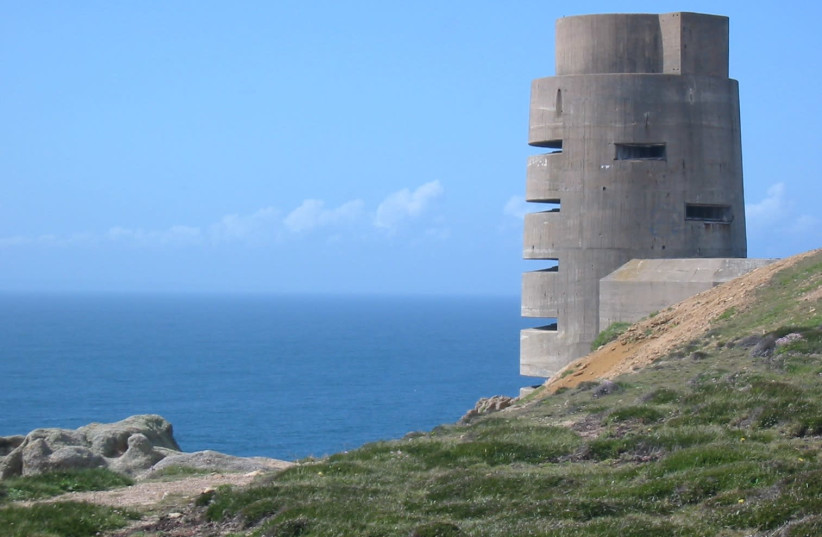Britain will begin investigating the number of deaths that occurred in two concentration camps that existed on British soil eighty years ago, according to media reports from July 22.
The camps had existed on the Channel Island Alderney, which was occupied during the war by German forces.
While the camp has been known about for some time, there has never been an investigation into the exact number of deaths that occurred at the camp or the size and magnitude of the SS-run operations there.
Some historians have estimated that anywhere between 700 and thousands of Jews, and other groups that were deemed undesirable by the Nazis, were killed in the camps and the bodies are buried in mass graves on the island. Officially, only eight Jews were recorded to have been murdered on the island.
“I would be surprised if the numbers killed by the Nazis either in Alderney or transported from Alderney on to extermination camps in Europe did not run into thousands,” Professor Anthony Glees told The Observer.
“It is evident from the wide range of testimonies available and from the surveys we did of the camps in which Jews were housed that they were treated appallingly, and more Jews likely died than we know of,” Caroline Sturdy Colls, professor of conflict archaeology at Staffordshire University, told the magazine Index on Censorship. The conditions in which Jews were housed were an extension of those that they were kept in elsewhere in Europe. The camps on Alderney were part of a network of sites that housed Jews and harsh punishments, terrible working and living conditions, and torture characterised their lives on Alderney.”

The investigation will be formally announced this summer by Lord Pickles, the United Kingdom’s Holocaust Envoy.
“The difference between the estimates is so large, I thought it sensible for everyone to put the facts on the table, for it all to be transparent and for the deliberations to be in the open. It seemed pointless people shouting across at each other. It would be better to have a proper discussion and to bring together a panel of international experts,” Pickles told The Observer.
“It is time for the British government and Alderney authorities to finally face up to the horror of what happened on British soil. There can be no more lies and no more cover-up,” Dame Margaret Hodge, the Labour MP whose father fled Nazi persecution in Germany, told The Guardian.
The decision to investigate the camps has been applauded by international experts
“This inquiry is a significant step toward telling this important history. Dealing openly and accurately with the Holocaust and the history of the Nazi persecution of other groups in all its dimensions is crucial and we expect the results to go a long way in protecting the facts, no matter how uncomfortable they may be,” Dr. Kathrin Meyer, secretary general of the IHRA, said to The Guardian.
Gary Mond, chairman of the National Jewish Assembly (NJA) in the UK, told The Jerusalem Post that "Lord Pickles is right. It is important, as far as is possible, to obtain as much accurate information as we can about Nazi atrocities in Alderney during the war and publicise it. If by doing so we can increase knowledge about the Holocaust for future generations, then this is helpful."
"The revelation concerning Camp Commander Hoffman should serve as a reminder to us all that far too many Nazi war criminals evaded justice."
Mond continued "It is important that incidents of Jew hatred in our country are always publicised and never covered up. I do think that, in recent years, there has been a greater tendency to do this, with good recent examples ranging from acknowledgement of Roald Dahl's antisemitism to the condemnation of the sadly all-too-frequent inappropriate comparisons of modern events to the Nazis and the Holocaust. "
It is important that incidents of Jew hatred in our country are always publicised and never covered up.
Gary Mond, chairman of the National Jewish Assembly
Nazi occupation of the island of Channel Islands
In 1940, the British prime minister at the time, Winston Churchill, decided that the islands could no longer be defended against the Nazis. The residents were evacuated and the Nazis used the island to house imprisoned slaves.
The Guardian reported that many of the imprisoned were killed by “Vernichtung durch Arbeit” or "extermination through labour," although it is known that others had been shot, given a lethal injection, or shipped to an extermination camp in Europe.
To date, it has been confirmed that at least one transit of hundreds of French Jews to the island had taken place.
The rough seas surrounding the island meant that prisoners on the island suffered from greater shortages than at other camps, National Geographic reported in 2020. In one witness testimony, it was said that a man’s body had been left hung for 4 days with a sign attached that read “for stealing bread”.
